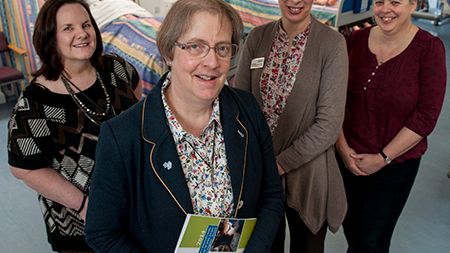
Press release -
Over 55s show more stamina in exercise scheme
Research from Northumbria University shows that older participants are more likely to complete exercise on referral programmes than their younger counterparts.
GP’s use the scheme to encourage physical activity as part of a patient’s treatment plan to tackle health concerns including obesity, cardio-vascular disease, musculoskeletal problems and mental health issues.The study, which has been published in the British Medical Journal Open and was presented at the British Science Festival in Newcastle, was commissioned to analyse the effectiveness of exercise on referral schemes which have been widely used in the UK since their launch in the 1990s.
Results taken from over 2,000 participants confirmed that over 55s and those referred due to cardio-vascular concerns were more likely to see the scheme through to the end than younger or obese patients.
81% of people referred took part in the scheme, with 42.9% completing the full 24-week programme of supervised activity across nine leisure sites in Northumberland. At the end of the programme, over 55% of participants aged 55+ completed the scheme, compared with only 21% of those who were aged 16-24.
PhD student, Coral Hanson, who led the project and is also the lead for exercise on referral in Northumberland, said: “We found that there was little insight into the activity levels associated with exercise on referral schemes. Additionally, of the research in existence, the majority of it took place over just three months and it is widely understood that it can take up to six months to establish behavioural change. We therefore set out to complete a thorough piece of research, working with a large sample of over 2,000 participants over a longer, 24 week period.
“As a result, this project has delivered more robust findings that can be used by healthcare professionals to adapt their schemes and ultimately deliver more effective programmes.”
Dr David Shovlin, a GP at Burn Brae Medical Group in Northumberland, has experience of using the scheme on behalf of his patients. He said: “Regular exercise is known to both prevent and improve control in a number of long-term conditions, notably hypertension and type 2 diabetes. It is a useful way to motivate patients initially to become more active, leading to improvements in the management of their condition and reduced need for medication.
“This research shows that people who complete the Exercise on Referral programme are more likely to engage in physical activity in the medium term. Additionally, getting a better understanding of which patients are more likely to drop out will make it possible to identify reasons for non-completion and explore alternative ways of helping those individuals to increase their activity levels.
“Ultimately, this will reduce wastage associated with unused appointments whilst creating more tailored schemes to benefit our patients.”
Richard Ripley, 65, from Cramlington, Northumberland, is one of the patients who has benefited from Exercise on Referral. Richard doubled his gym attendance after being referred onto the scheme to assist in the treatment of type 2 diabetes. Over a year later, he is still attending the gym. Recently, Richard was diagnosed with angina and has since added an extra day to his weekly workouts to support the treatment of his condition. Richard said: “Finding out that I have angina was quite a shock and it has encouraged me to start an extra Friday session at the gym in September.
“The longer you attend the better you get at the various activities which spurs you on to do even more. It definitely gives you a new outlook on life and I fully intend to keep my activity levels up.”
Topics
Categories
Northumbria is a research-rich, business-focussed, professional university with a global reputation for academic excellence. To find out more about our courses go towww.northumbria.ac.uk
If you have a media enquiry please contact our Media and Communications team at media.communications@northumbria.ac.uk or call 0191 227 4571.








